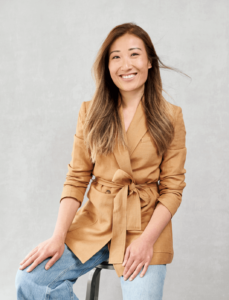
Women entrepreneurs are bold and resilient, with a growing presence in the Canadian small business community. In fact, our recent survey shows that 37 per cent of self-employed entrepreneurs and 16 per cent of small medium enterprises are women-owned in Canada.
They take challenges head-on with an innovative spirit, empathetic mindset and fearless heart. It’s without question that small businesses make a massive contribution to the Canadian economy and all business owners are faced with challenges along their journey.
However, we’ve learned that women face increased and unique barriers when running their business, and we all play an important role in breaking those barriers down, and making resources, tools, knowledge, and in turn, success, equally accessible for every business owner.
While these findings reinforce the resilience and determination of women business owners, it also highlights the challenges and triumphs of this community, serving as a reminder to us of how much more work there is to be done to create an inclusive workforce.

We want to celebrate how women contribute to building Canada’s economy as both members of society and members of the business community, while bringing attention to the inequities they face, and raising awareness to encourage support and equity for the women-owned business community.
I recently had the pleasure of hearing from a woman business owner and QuickBooks customer, Kathy Tran-Riese, founder of KayTran Eyewear, and learned about her experience as an entrepreneur, the barriers she has faced along her journey, and how Canadians can celebrate and support women business owners today, and every day.
Tell us about the inspiration behind your business and desire to become an entrepreneur.
KT: I struggled for years looking for eyewear and sunglasses that fit my lower nose bridge without slipping or rubbing on my cheeks. While completing my MBA in London, Ontario, I was searching for sunglasses and was told by a clerk that “they don’t make them for my face”. That was the turning point moment that inspired me to build an inclusive fit for individuals across all backgrounds, who shared my facial features. Most eyewear available in the market is made for a Eurocentric fit that suits higher nose bridges. I started KayTran Eyewear because I wanted to give people with low nose bridges stylish, affordable options for eyewear that were tailored to our specific facial features.
I grew up in an entrepreneurial household, as my parents started a baking business when they immigrated to Canada, which largely influenced my dreams to ultimately pursue an entrepreneurial path. I had first hand experience seeing all the challenges they faced, but I knew I wanted to build something on my own terms. Wearing the many hats of a small business owner is something that I love. It allows me to be passionate about what I do and take on new challenges, while creating, innovating and running the day-to-day.
We recently conducted a survey to recognize how women contribute to our country’s economy as entrepreneurs and highlight the unique challenges they face in running a business. What are some obstacles you’ve experienced throughout your business journey?
KT: I was in my mid-twenties when I first started my business. Working as a young woman came with a number of perceptions and biases that created an uphill battle to be taken seriously by manufacturers, buyers, retailers etc. I can’t count how many times I was told this business would be “too niche” to succeed, or when production issues occurred and people tried to bully me into accepting the financial consequences of them when I knew I didn’t have to.
I often wonder now if I would have had those experiences had I been a different age, gender, or ethnicity. Luckily, I found a mentor in the field who was encouraging of my career journey, introduced me to the right partners and guided me to build my first collection, which I am still grateful for to this day.
Our research revealed that women business owners are chasing success at the same rate as men. Yet, 26 per cent of women-owned businesses report that the current financial health of their business is worse than it was a year ago compared to 18 per cent of men. Why do you think women are struggling more with the financial health of their business? What tools or advice would you share to help with this?
KT: I think a lot of it comes down to knowledge and tools. Studies continue to show that relatively speaking, women are less likely to know how much revenue they need to be profitable, what marketing strategies provide the best returns and continue to receive less capital to start their business. As a small business owner, you’re always making financial trade-offs whether it’s investing in marketing to grow, inventory, cutting back on product development and more.
For me, diligent planning and budgeting, as well as easy financial tools have been critical to managing my business’ expenses. It’s given me visibility to the revenue and cash flow I need to grow, plan accordingly and seek the capital to get there.
Finding a support group of individuals who can mentor and offer you advice is also so important. You’re constantly learning and need people who believe in you by sharing knowledge that will help you succeed, whether it’s making ads more effective or discovering new negotiation tactics with suppliers.
I come from a family of side hustlers and entrepreneurs, so I have seen first-hand the balancing act of juggling work/home responsibilities for women business owners. It can also lead to the pressure of feeling out of depth at work, which more than a third of women report feeling at least once a week. What advice would you give to other female entrepreneurs to improve work/life balance and to feel more confident on the job?
KT: As a mother, I often struggle with ‘mom-guilt’ that comes from balancing work, my entrepreneurial goals and time with my family. It’s always a work in progress and will never be perfect, but my advice to other female entrepreneurs is to take a moment to define what “success” means to you at that stage in your life. When people view “success”, I think they often see an entrepreneur who gives every part of their being to their work, has a steady stream of financial growth or someone who has never failed. But it simply isn’t the reality nor sustainable.
When big life changes occur like becoming a mother, sometimes it forces us to redefine success. We can’t give 100% to both home and work at the same time. It needs to be shared and that percentage is going to ebb and flow depending on our life circumstances. At this stage in my life, success includes having dinner with my kids every night and taking them to skating lessons, while still working towards growing my business. Embracing this mentality has re-shaped my identity as a mom and entrepreneur, which has really helped me feel fulfilled with both work and home.
Why is it important for Canadians to support women-owned businesses? How can they show up for this community?
KT: There are so many inspiring and impactful businesses being created by women here in Canada. These businesses contribute to our economy, create new jobs, while collectively helping to shape the future for youth aspiring to be entrepreneurs. Even at this stage in my career, I continue to be inspired by female entrepreneurs so we can’t underestimate the impact they have on younger generations with similar aspirations.
Some of the ways that I try to show up for this community is taking an active interest in discovering independent, women-owned businesses through social media and supporting them where possible. Whether they are local brick and mortar shops to e-commerce, I love searching for and sharing these small businesses with others. It’s my small way of showing them that they’re making an impact and that we’re here to help them thrive.
Puja Subrun is the Head of Marketing at Intuit QuickBooks Canada.



Leave a Reply